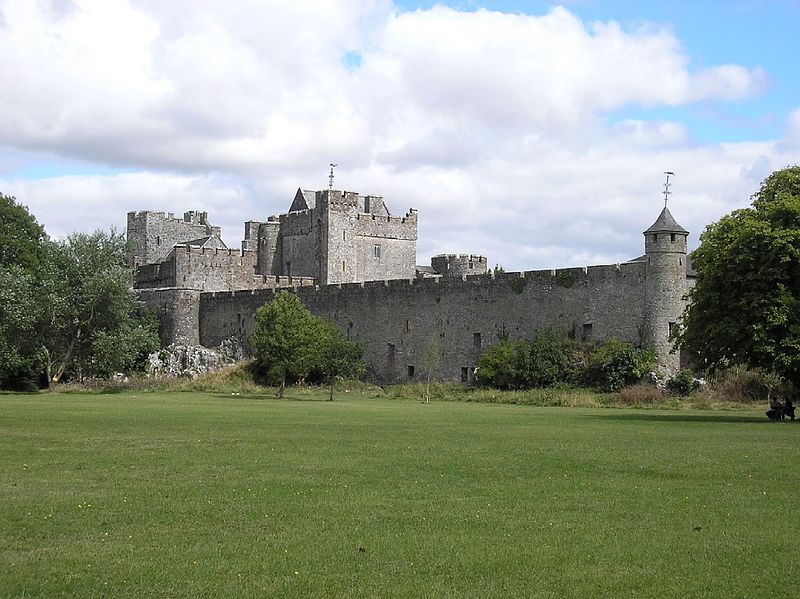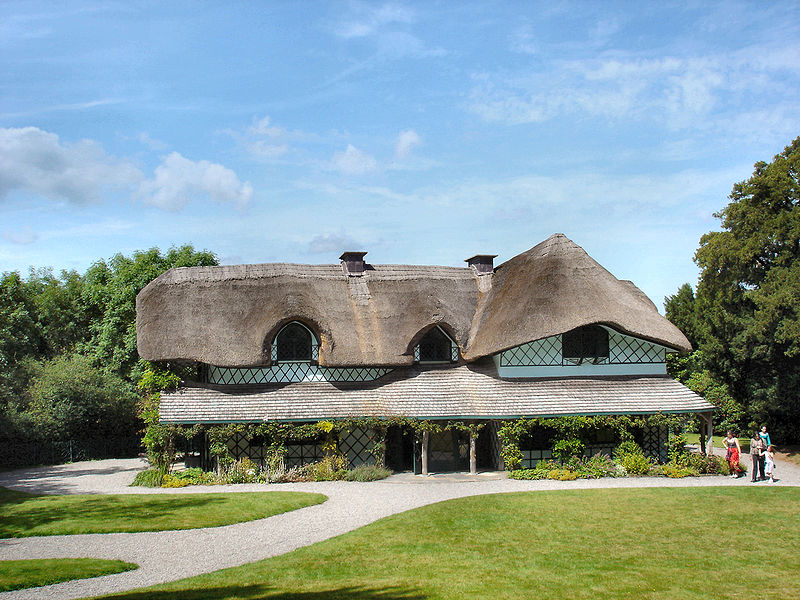This is a branch of the noble house of ORMONDE, springing from
JAMES, 3rd Earl of Ormond (c1359-1405); who, besides legitimate children, had two illegitimate sons, Thomas, Prior of Kilmainham and Lord Deputy of Ireland in the reigns of HENRY IV and HENRY V; and
JAMES LE BOTELLER or BUTLER, whose descendants, by the settlement of Thomas, the 10th Earl, were made next in remainder to the house of Ormonde after the family of Dunboyne.
From this James lineally descended
THOMAS BUTLER, of Cahir, who married Ellice, daughter of the Earl of Desmond, and was father of
THOMAS BUTLER (1448-76), who wedded Catherine, daughter of Sir Piers Power, of County Waterford, by whom he had two sons; the younger of whom, Piers, was father of Theobald, 3rd Baron Cahir; and the elder,
THOMAS BUTLER, was elevated to the peerage, in 1543, in the dignity of Baron Cahir.
His lordship espoused Eleanor, fifth daughter of Piers, 8th Earl of Ormond, and was succeeded by his only surviving son,
EDMUND, 2nd Baron; who died without issue, in 1560, when the barony expired, and his two half-sisters became his heirs.
The dignity was, however, revived in 1583 by a new patent granted to his lordship's first cousin,
SIR THEOBALD BUTLER, Knight, who became thus 1st Baron Cahir of the second creation.
His lordship married Mary, daughter of Sir Thomas Cusack, of Cussington, County Meath, LORD CHANCELLOR OF IRELAND, and had issue,
THOMAS, his successor;He died in 1596, and was succeeded by his eldest son,
Edmund;
James;
Ellen; Mary.
THOMAS, 2nd Baron, who died in 1627, and leaving an only daughter and heir, Margaret, who wedded Edmund, 3rd Baron Dunboyne, the barony devolved upon his nephew,
THOMAS, 3rd Baron, who espoused Eleanor, granddaughter of Lord Poer, by whom he had seven children.
His lordship died ca 1648, and was succeeded by his grandson,
PIERCE, 4th Baron; who died in 1676, when the family honours reverted to
THEOBALD, 5th Baron, son of Edmund (3rd son of the 1st Baron), who died in 1700, and was succeeded by his son,
THOMAS, 6th Baron; whose son,
JAMES, 7th Baron, succeeded in 1744, though died without issue, 1746, and was succeeded by his brother,
PIERCE, 8th Baron, at whose demise, unmarried, in 1788, the title reverted to his kinsman,
JAMES, 9th Baron, who was in India at the time of his predecessor's death and so never received the news of his elevation as he died a month later, in 1788.
RICHARD (1775–1819), 10th Baron (son of James Butler, of Fethard, County Tipperary, and grandson of Richard Butler, of Glengall, who was descended from Sir Theobald Butler, 1st Baron Cahir through his third son, the Hon Pierce Butler).
His lordship wedded, in 1793, Emily, youngest daughter of James St John Jefferyes, of Blarney Castle, County Cork, and had issue,
RICHARD, his successor;His lordship was advanced, in 1816, to the dignities of Viscount Cahir and EARL OF GLENGALL.
Harriet Anne, m George, 3rd Marquess of Donegall;
Charlotte Butler; Emily Georgina Arabella.
He was succeeded by his only son,
RICHARD, 2nd Earl (1794-1858), who espoused, in 1834, Margaret Lauretta, younger daughter and co-heir of William Mellish, of Woodford, Essex, and had issue, two daughters.
Having no male issue, the titles expired on his decease in 1858.
Harriet Anne, Countess of Belfast
Glengall Street in Belfast is named after this marital union.
One of his daughters, the Lady Margaret Butler, inherited her father's extensive estate at Cahir, County Tipperary, following his death in 1858.
In that year she married Lieutenant-Colonel the Hon Richard Charteris (1822-74), and built Cahir Park as the family home.
She was succeeded by her eldest son, Lieutenant-Colonel Richard Butler Charteris (1866-1961), who continued to live at Caher until his death.
CAHIR CASTLE stands on an island in the River Suir by the town of Cahir.
It was built in the 13th century on a site of an earlier native fortification called a cathair (stone fort), which gave its name to the place.
The castle was built in two parts, with the side now by the street being built 200 years before the side now housing the audio-visual show.
Granted to the Butlers in the late 14th century, the castle was enlarged and remodelled between the 15th and 17th centuries.
It fell into ruin in the late 18th century, when the family ceased to live in it, though was partially restored in the 1840s. The Great Hall was partly rebuilt in 1840.
It is now a national monument managed by the Irish state.
 |
| Richard, 2nd Earl of Glengall |
One of his daughters, the Lady Margaret Butler, inherited her father's extensive estate at Cahir, County Tipperary, following his death in 1858.
In that year she married Lieutenant-Colonel the Hon Richard Charteris (1822-74), and built Cahir Park as the family home.
She was succeeded by her eldest son, Lieutenant-Colonel Richard Butler Charteris (1866-1961), who continued to live at Caher until his death.
CAHIR CASTLE stands on an island in the River Suir by the town of Cahir.
It was built in the 13th century on a site of an earlier native fortification called a cathair (stone fort), which gave its name to the place.
The castle was built in two parts, with the side now by the street being built 200 years before the side now housing the audio-visual show.
Granted to the Butlers in the late 14th century, the castle was enlarged and remodelled between the 15th and 17th centuries.
It fell into ruin in the late 18th century, when the family ceased to live in it, though was partially restored in the 1840s. The Great Hall was partly rebuilt in 1840.
It is now a national monument managed by the Irish state.
Instead, they built a house of three storeys and five bays, now the Cahir House hotel, facing the main town square and backing on to the castle park.
Swiss Cottage, a delightful cottage orné, was built in the early 1800s by the 1st Earl, it has been said, for a mistress, to a design by the famous Regency architect John Nash.
Its interior contains a graceful spiral staircase and some elegantly decorated rooms.
The wallpaper in the salon manufactured by the Dufour factory is one of the first commercially produced Parisian wallpapers.
Following the death of the 2nd Earl in 1858, his daughter, Lady Margaret Charteris, built the house known as Cahir Park, or Cahir Lodge, across the river from the ancient Castle.
This mansion served as the family seat from then on.
It was built about 1861, designed by Lanyon, Lynn & Lanyon; though, according by Bence-Jones, was neither "worthy of its architects, nor of its glorious setting".
It was said to be exceptionally dull and dour, quasi-Baronial, with steep gables, pointed plate-glass windows, and a turret with a pyramidal roof.
Its rooms were apparently "meanly proportioned", though redeemed with some French furniture.
During the 20th century, Colonel Charteris added a billiards-room-cum-library.
The house, somewhat ingloriously, was gutted by fire shortly after it had been sold following the Colonel's death, at the advanced age of 94, in 1961.
Former London residence ~ 54 Grosvenor Street.
First published in January, 2013. Glengall arms courtesy of European Heraldry.
Swiss Cottage, a delightful cottage orné, was built in the early 1800s by the 1st Earl, it has been said, for a mistress, to a design by the famous Regency architect John Nash.
Its interior contains a graceful spiral staircase and some elegantly decorated rooms.
The wallpaper in the salon manufactured by the Dufour factory is one of the first commercially produced Parisian wallpapers.
 |
| Cahir Park |
This mansion served as the family seat from then on.
It was built about 1861, designed by Lanyon, Lynn & Lanyon; though, according by Bence-Jones, was neither "worthy of its architects, nor of its glorious setting".
It was said to be exceptionally dull and dour, quasi-Baronial, with steep gables, pointed plate-glass windows, and a turret with a pyramidal roof.
Its rooms were apparently "meanly proportioned", though redeemed with some French furniture.
During the 20th century, Colonel Charteris added a billiards-room-cum-library.
The house, somewhat ingloriously, was gutted by fire shortly after it had been sold following the Colonel's death, at the advanced age of 94, in 1961.
Former London residence ~ 54 Grosvenor Street.
First published in January, 2013. Glengall arms courtesy of European Heraldry.




No comments:
Post a Comment